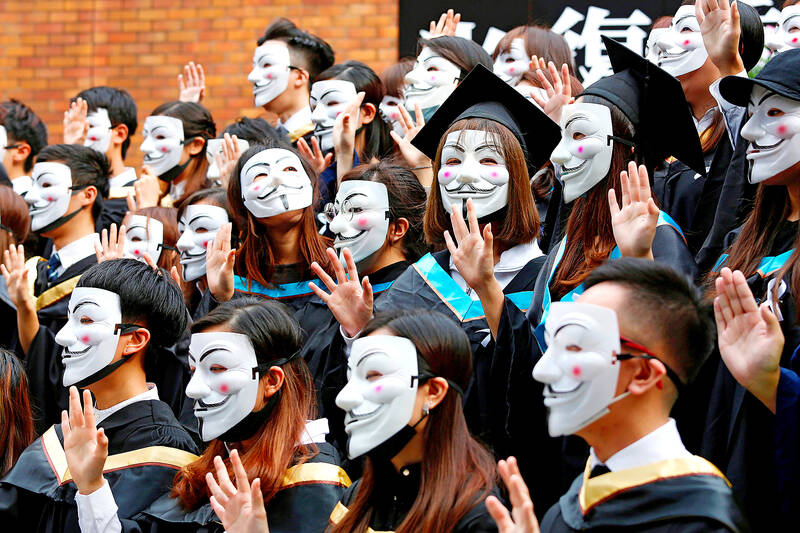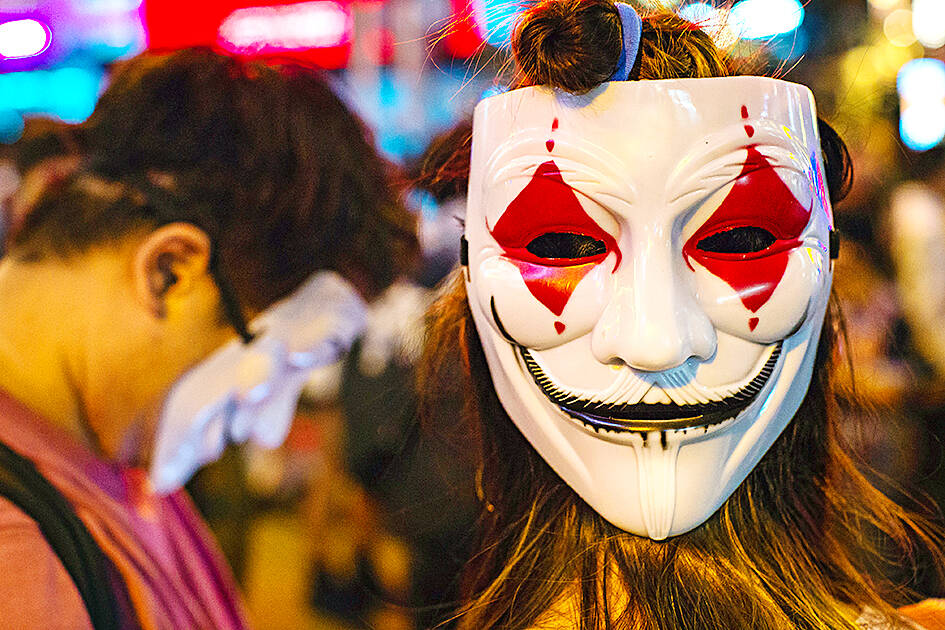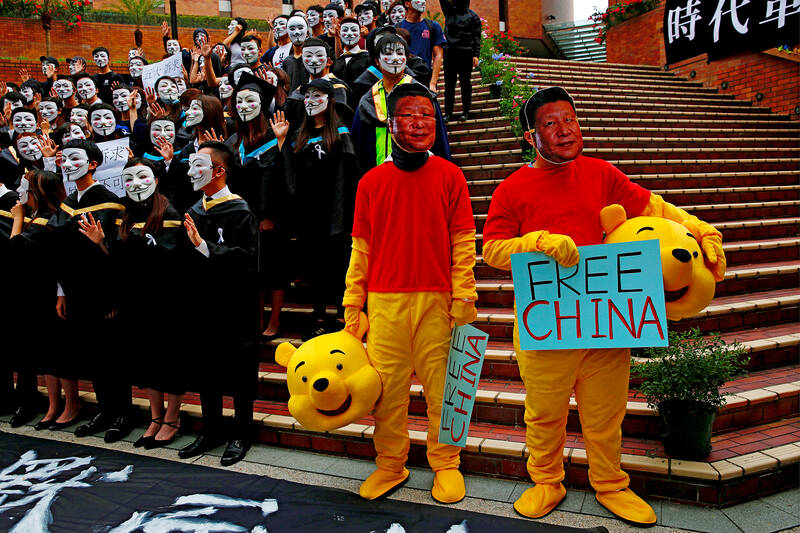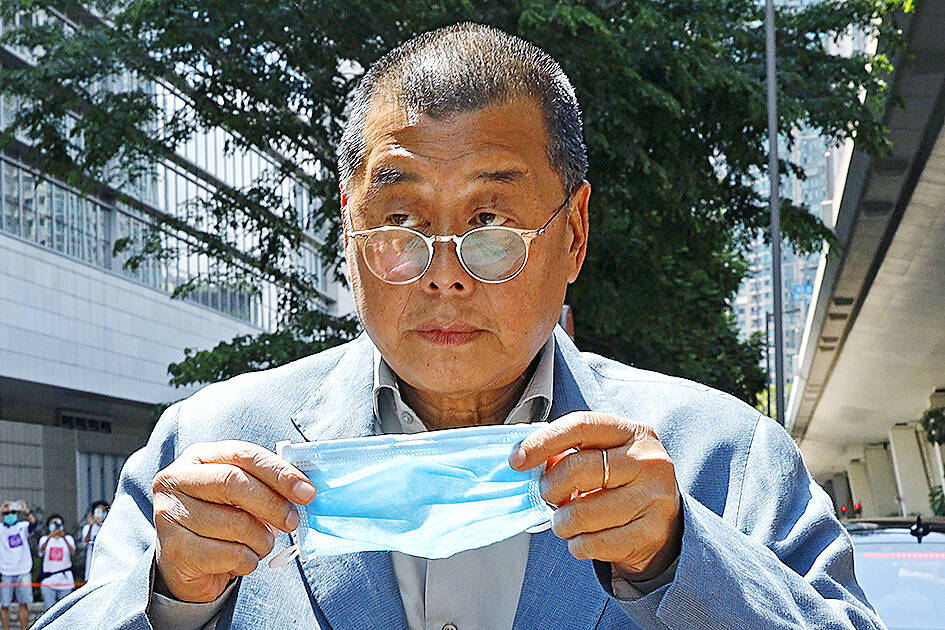Protesters involved in the 2019-2020 pro-democracy movement in Hong Kong have been treated extraordinarily harshly by the criminal justice system compared with local and international norms, a report has found.
The surge in arrests, detentions and charges in the wake of the anti-extradition bill protests that saw millions of Hongkongers taking to the streets to oppose closer ties with mainland China meant that the criminal justice system was put under “extreme stress,” according to Jun Chan, Eric Yan-ho Lai and Thomas E Kellogg at the Center for Asian Law of Georgetown University.
“In nearly all respects, the post-2019 response has on average been more punitive than prior responses to social movements, particularly the 2014 umbrella movement,” the authors said.

Photo: Reuters
As of August last year, more than 10,000 Hongkongers had been arrested in connection with the 2019 protest movement and nearly 3,000 prosecuted, according to government statistics. The Georgetown researchers analyzed more than 1,500 cases that had concluded by July 31, 2021.
Protesters were charged with 100 different types of offences. These included unlawful assembly, rioting, police obstruction and police assault. More than 80 percent of people convicted received custodial sentences, compared with just over 31 percent of people who were convicted on charges relating to the umbrella movement. The most common charge in the dataset was unlawful assembly, a colonial-era ordinance that allows the authorities to prosecute peaceful protesters.
The anti-extradition bill protests lasted for more than six months in 2019-2020, much longer than the umbrella movement in 2014. They were ultimately defeated in June 2020 by the imposition of a draconian national security law (NSL) that effectively banned all forms of dissent and carries a maximum of a life sentence. The Chinese and Hong Kong authorities said the law was needed to restore stability.

Photo: Bloomberg
As of September, 280 people had been arrested under the NSL, including high profile figures such as the activist Joshua Wong (黃之鋒) and the former media proprietor Jimmy Lai (黎智英). These cases are tried in separate courts, with judges hand-picked by the executive.
But most of the people swept into the criminal justice system after the protests have been charged with more ordinary offences, with many detained for several months in pre-trial detention.
Between 2019 and 2021, the average waiting time for criminal trials increased by 50 percent, to 287 days, well beyond the official target of 100 days.

Photo: Reuters
“Such long wait times suggest that the court system is flailing under the weight of a massively increased caseload,” the report said.
More than 130 of the defendants in the cases analyzed by the researchers were under 18, with the median age being 23. More than 66 percent of juvenile convictions resulted in custodial sentences, which the researchers describe as “an extraordinarily high rate of incarceration for children”.
By comparison, In England and Wales, 5 percent of juveniles who received criminal convictions in 2021 were put in custody.

Photo: AP
Open displays of dissent in Hong Kong are now exceedingly rare. In March, a small protest about a land reclamation plan took place under close police monitoring, the first time that any kind of demonstration had been allowed since 2020.
John Lee (李家超), the city’s chief executive, has said that introducing another Hong Kong national security law, in addition to the one imposed by Beijing in 2020, is a priority for next year.

That US assistance was a model for Taiwan’s spectacular development success was early recognized by policymakers and analysts. In a report to the US Congress for the fiscal year 1962, former President John F. Kennedy noted Taiwan’s “rapid economic growth,” was “producing a substantial net gain in living.” Kennedy had a stake in Taiwan’s achievements and the US’ official development assistance (ODA) in general: In September 1961, his entreaty to make the 1960s a “decade of development,” and an accompanying proposal for dedicated legislation to this end, had been formalized by congressional passage of the Foreign Assistance Act. Two

March 31 to April 6 On May 13, 1950, National Taiwan University Hospital otolaryngologist Su You-peng (蘇友鵬) was summoned to the director’s office. He thought someone had complained about him practicing the violin at night, but when he entered the room, he knew something was terribly wrong. He saw several burly men who appeared to be government secret agents, and three other resident doctors: internist Hsu Chiang (許強), dermatologist Hu Pao-chen (胡寶珍) and ophthalmologist Hu Hsin-lin (胡鑫麟). They were handcuffed, herded onto two jeeps and taken to the Secrecy Bureau (保密局) for questioning. Su was still in his doctor’s robes at

Last week the Democratic Progressive Party (DPP) said that the budget cuts voted for by the China-aligned parties in the legislature, are intended to force the DPP to hike electricity rates. The public would then blame it for the rate hike. It’s fairly clear that the first part of that is correct. Slashing the budget of state-run Taiwan Power Co (Taipower, 台電) is a move intended to cause discontent with the DPP when electricity rates go up. Taipower’s debt, NT$422.9 billion (US$12.78 billion), is one of the numerous permanent crises created by the nation’s construction-industrial state and the developmentalist mentality it

Experts say that the devastating earthquake in Myanmar on Friday was likely the strongest to hit the country in decades, with disaster modeling suggesting thousands could be dead. Automatic assessments from the US Geological Survey (USGS) said the shallow 7.7-magnitude quake northwest of the central Myanmar city of Sagaing triggered a red alert for shaking-related fatalities and economic losses. “High casualties and extensive damage are probable and the disaster is likely widespread,” it said, locating the epicentre near the central Myanmar city of Mandalay, home to more than a million people. Myanmar’s ruling junta said on Saturday morning that the number killed had